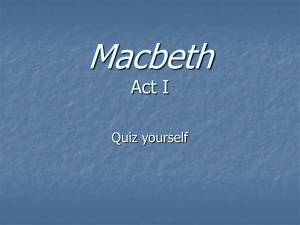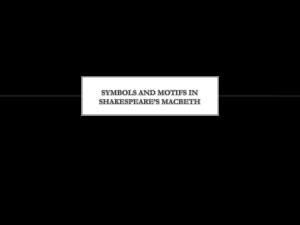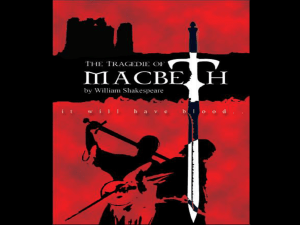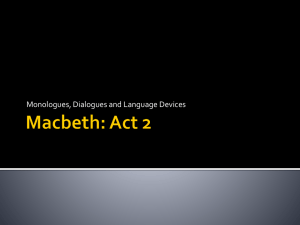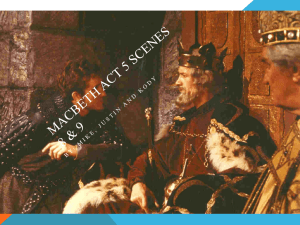File - fhsenglishrevise
advertisement
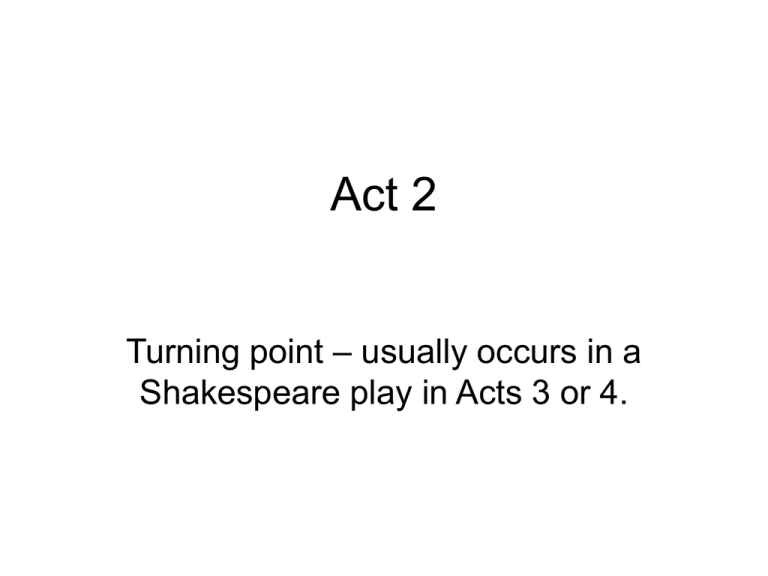
Act 2 Turning point – usually occurs in a Shakespeare play in Acts 3 or 4. Scene 1 Banquo is uneasy – the stars are hiding their fires Slip of the tongue : our (19), we (24) Hallucination or a supernatural dagger? How reliable are the senses to ascertain the real – note the imagery used to describe the situation and his response to it. Scene 2 Lady Macbeth jumpy Macbeth horrified by what he has done so much so he brings the daggers with him Macbeth frightened by the fact he cannot say amen Macbeth disturbed by the voice saying ‘Macbeth hath murdered sleep. Macbeth shall sleep no more’. Lady Macbeth’s prophecy: ‘These deeds must not be thought of – they will make us mad’ ‘water will clear us of this deed’ – it does not. Her hands end up covered in blood too. The ‘picture’ imagery is another version of the appearance/reality concept. Explain : Gilding the faces is an extension of it Scene 3 – The Porter’s scene • • • • • • The scene is much more important than just ‘comic relief’ Knock three times an old superstition. Macbeth’s castle is hell Beelzebub is one devil, the equivocator is another The equivocator refers to the trial of the Gunpowder plotters The devil and Hell is mentioned three times • The lechery discourse is about a significant vice; structurally it is repeated thesis/antithesis, and is then linked with the concept of equivocation – something the witches have been doing – although in a different form. Macduff and Lennox arrive at the south gate – it is they who have been ‘knocking’. Lenox talks about supernatural events that night. Macduff discovers the murder and announces ‘Confusion’; what is it a personification of ? Macbeth kills the guards and equivocates – perhaps that is why Macduff does not appear to trust him. Donalbain and Malcolm seeing the situation threatening which allows Macbeth to exploit the suggestion that they were somehow involved in Duncan’s murder. Scene 4 rounds of the act with Macbeth elected to be king. Act 3 Scene 1 • Banquo beginning to be suspicious of Macbeth. • I fear thou played most foully for it • Macbeth sees Banquo as a threat, and that everything has been done for Banquo’s sons. • To be thus is nothing.. • Macbeth organises Banquo (and Fleance’s) murder. Act 3 Scene 2 • • • • • Lady Macbeth dissatisfied with her situation. Noughts had, all’s spent.. Macbeth tells her he has plans (note the change from Act 1) Be innocent of the knowledge Come seeling night (cp. Come thick night… Act 1) • Act 3 sc 3 • The murder of Banquo (at night) Act 3 sc 4 Macbeth has a banquet (compare to the one held for Duncan) – degree (see Marxist criticism sheet) Murder enters with blood on his face (Gothic technique) Macbeth being clever asks for a toast to Banquo and the ghost appears – happens twice and each time Macbeth is more terrified. He is the only one who can see the ghost. The ghost is an actor’s part – even though it says nothing but is the whole thing a ghost of the mind (cp the knife in II i), which would also be Gothic. Macbeth’s imagery could also be described as ‘Gothic’, talking about what hew has seen as unreal as creatures formed by cloud shapes. The guests leave in any order or disorder. Act 3 sc 4 Macbeth talks about his fit – when he hears about Fleance’s escape; Macbeth talks about his strange infirmity, Lady Macbeth does not want him asked any questions Questions enrage him (cp. Her fainting when Macbeth kills the guards and MacDuff wants to ask more questions) Macduff did not go to hMacbeth’s coronation and did not go to the Banquet. Evidence of becoming a tyrant when Macbeth talks about ‘a servant fee’d’ and ‘I am in blood stepped in so far.’ He decides to go to the witches to find out more about what is going to happen. Act 3 scene 5 The Witches are getting told off by Hecate for meddling. You need to think about what this very short scene is intended to contribute to the story. Scene 6 This is really to bring the audience up to speed as to what is happening elsewhere – to conform to Aristotle's unities: Macbeth’s negative reputation, the murder of the King and Banquo (and who else?); and the whereabouts of Macduff and Malcolm - in England organising an army.



